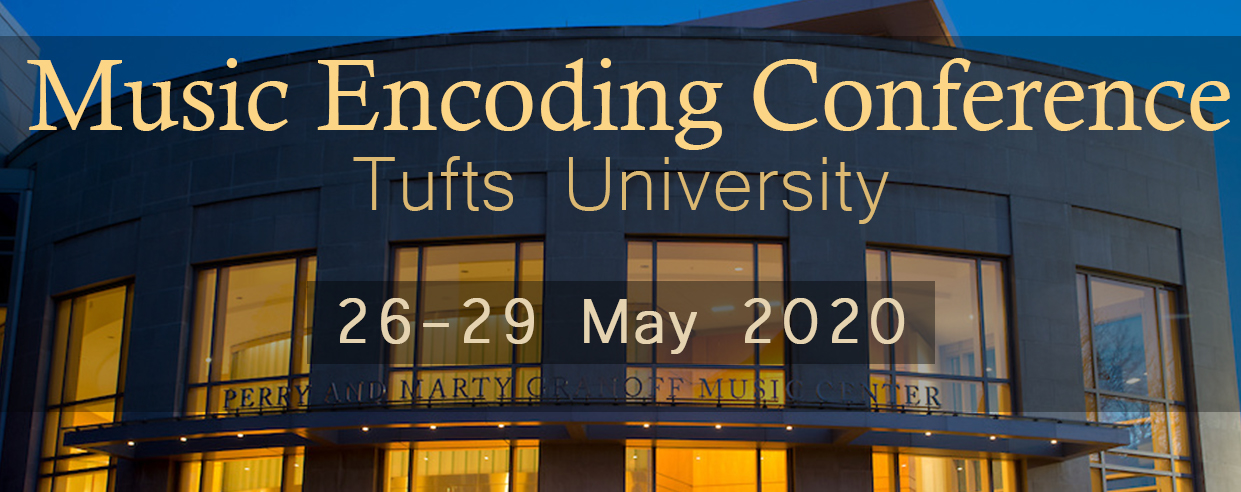
The Music Encoding Conference is the annual meeting of the Music Encoding Initiative (MEI) community and all who are interested in the digital representation of music. We are pleased to announce our call for papers, posters, panels, and workshops. The deadline for submission is 22 December 2019. (Note that this is a firm deadline--there will be no extensions.)
Music encoding is a critical component for fields and areas of study including computational or digital musicology, digital editions, symbolic music information retrieval, and digital libraries. This event brings together specialists from various music research communities, including technologists, librarians, music scholars, and students and provides an opportunity for learning and engaging with and from each other.
The MEC will take place 26-29 May 2020 at Tufts University in Medford, MA (in metropolitan Boston), hosted by Tisch Library and Lilly Music Library. It is co-sponsored with the Department of Music at Tufts, Digital Scholarship Group at Northeastern University Library, and MIT Digital Humanities.
The study of music encoding and its applications has emerged as a critical area of interest among scholars, librarians, publishers, and the wider music industry. The Music Encoding Conference has emerged as the foremost international forum where researchers and practitioners from across these varied fields can meet and explore new developments in music encoding and its use. The Conference celebrates a multidisciplinary program, combining the latest advances from established music encodings, novel technical proposals and encoding extensions, and the presentation or evaluation of new practical applications of music encoding (e.g. in academic study, libraries, editions, commercial products).
Pre-conference workshops provide an opportunity to quickly engage with best practice in the community. Newcomers are encouraged to submit to the main program with articulations of the potential for music encoding in their work, highlighting strengths and weaknesses of existing approaches within this context.
Following the formal program an unconference session fosters collaboration in the community through the meeting of Interest Groups, and self-selected discussions on hot topics that emerge during the conference. Interest Groups can also choose to meet May 24, 25, or 26 in various spaces generously provided by the host library. (Please be in touch with conference organizers with requests reserve these spaces.)
The program welcomes contributions from all those working on, or with, any music encoding. In addition, the Conference serves as a focus event for the Music Encoding Initiative community, with its annual community meeting scheduled the day following the main program. We in particular seek to broaden the scope of musical repertories considered, and to provide a welcoming, inclusive community for all who are interested in this work.
Participants are encouraged to attend all four days of the MEC:
The conference welcomes contributions from all those who are developing or applying music encodings in their work and research. Topics include, but are not limited to:
and the use or application of music encodings in:
Authors are invited to upload their anonymized submission for review to our Conftool website: www.conftool.net/music-encoding2020.
The final (and definitive) deadline for all submissions is 22 December 2019. Conftool accepts abstracts as PDF files only. The submission to Conftool must include:
Paper and poster proposals must include an abstract of no more than 1000 words. Relevant bibliographic references may be included above this limit (i.e. will not be counted within the 1000 word limit). Please also include a short statement regarding your current interests related to music encoding.
Panel discussion proposal abstracts must be no longer than 2000 words, and describe the topic and nature of the discussion, along with short biographies of the participants. Panel discussions are not expected to be a set of papers which could otherwise be submitted as individual papers.
Proposals for half- or full-day pre-conference workshops, to be held on May 26th, should include the workshop’s proposed duration, as well as its logistical and technical requirements.
The program committee will communicate the results of its deliberations on or about January 31, 2020.
In case of questions, feel free to contact: conference2020 at music-encoding.org.